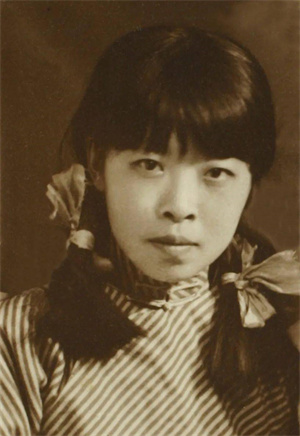
永远的憧憬 〔1〕 和追求
◎ 萧红
一九一一年,在一个小县城里边,我生在一个小地主的家里。那县城差不多就是中国的最东最北部——黑龙江省 〔2〕 ——所以一年之中,倒有四个月飘着白雪。
父亲常常为着贪婪而失掉了人性。他对待仆人,对待自己的儿女,以及对待我的祖父都是同样的吝啬而疏远,甚至于无情 〔3〕 。
有一次,为着房屋租金的事情,父亲把房客的全套的马车赶了过来。房客的家属们哭着诉说着 〔4〕 ,向我的祖父跪了下来,于是祖父把两匹棕色的马 〔5〕 从车上解下来还了回去。
为着这匹马,父亲向祖父起着终夜的争吵 〔6〕 。“两匹马,咱们是算不了什么的,穷人,这匹马就是命根 〔7〕 。”祖父这样说着,而父亲还是争吵。九岁时,母亲死去。父亲也就更变了样 〔8〕 ,偶然打碎了一只杯子,他就要骂到使人发抖的程度。后来就连父亲的眼睛也转了弯,每从他的身边经过,我就像自己的身上生了针刺一样 〔9〕 ;他斜视着你,他那高傲的眼光从鼻梁经过嘴角而后往下流着 〔10〕 。
所以每每在大雪中的黄昏里 〔11〕 ,围着暖炉,围着祖父,听着祖父读着诗篇,看着祖父读着诗篇时微红的嘴唇 〔12〕 。
父亲打了我的时候,我就在祖父的房里,一直面向着窗子,从黄昏到深夜——窗外的白雪,好像白棉花一样飘着;而暖炉上水壶的盖子,则像伴奏的乐器似的振动着 〔13〕 。
祖父时时把多纹的两手放在我的肩上,而后又放在我的头上,我的耳边便响着这样的声音:
“快快长吧!长大就好了。”
二十岁那年,我就逃出了父亲的家庭。直到现在还是过着流浪的生活。
“长大”是“长大”了,而没有“好”。
可是从祖父那里,知道了人生除掉了冰冷和憎恶而外,还有温暖和爱。
所以我就向这“温暖”有“爱”的方面,怀着永久的憧憬和追求。
My Everlasting Dream and Pursuit
◎ Xiao Hong
In 1911, I was born into a petty landlord family in a remote county town in Heilongjiang Province—a town situated virtually at the northeastern tip of China. We had snow there for as long as one third of a year.
Father, driven by avarice, often became very unfeeling. He would treat his servants, his own children and even my grandpa alike with meanness and indifference, not to say with ruthlessness.
Once, due to a dispute over house rent, he took away by force a tenant’s horse-drawn cart and drove it home. The tenant’s family came to see grandpa and, dropping to their knees, tearfully related their troubles. Grandpa unharnessed the two chestnut horses and returned them to the tenant.
That touched off a night-long quarrel between father and grandpa. “The two horses mean nothing to us, but everything to the poor,” argued grandpa. Father, however, refused to listen. Mother died when I was nine. From then on father went from bad to worse. Even a mere cup accidentally broken by someone would send him into such a violent rage that we all shivered with fear. Later, whenever I happened to walk past him, he would even have his eyes directed sideways, which made me feel like being pricked all over on thorns. When he looked askance at me, superciliousness gushed from his eyes down the bridge of his nose and then off the corners of his mouth.
Often of a snowy evening, we children would hang about grandpa by a heating stove, listening to him reading poems aloud and meanwhile watching his busy ruddy lips.
Whenever father had given me a beating, I would seek solace in grandpa’s room where I would stay gazing out of the window from dusk till late into the night while snowflakes were flying like cotton and the lid of the kettle over the heating stove rattling like a musical instrument playing an accompaniment.
Grandpa would place his wrinkled hands on my shoulder and then on my head, saying,
“Grow up quick, poor child! You’ll be all right after you’ve grown up.”
I fled from home at twenty. And so far I still live the life of a vagrant.
True, I’ve “grown up”, but I’m not yet “all right”.
Nevertheless, from grandpa I’ve learned that apart from coldness and hatred, there is also warmth and love in life.
Hence my everlasting dream and pursuit of this “warmth” and “love”.
萧红(1911一1942),黑龙江省呼兰县人,官僚地主家庭出身,是才华横溢的女作家。《永远的憧憬和追求》是她应美国友人斯诺之约而写的小传。文章诉说她如何在祖父的关怀和抚育下度过寂寞的幼女时代。
注释
〔1〕 “憧憬”译为dream,和aspiration、longing、yearning等同义。
〔2〕 “那县城差不多就是中国的最东最北部——黑龙江省”意即“那小县城在黑龙江省,差不多位于中国的东北角”。现译为in a remote town in Heilongjiang Province—a town situated virtually at the northeastern tip of China,其中以remote(偏僻的、边远的)表达“小”,便于烘托原文的气氛;at the northeastern tip of China比in China’s northeastern part灵活顺口。
〔3〕 “甚至于无情”译为not to say with ruthlessness,其中not to say是英语成语,意即and almost或and perhaps even。
〔4〕 “哭着诉说着”译为tearfully related their troubles,其中related意同told。
〔5〕 “棕色的马”译为chestnut horses。英语常用chestnut指马的棕色,或棕色的马。
〔6〕 “为着这匹马,父亲向祖父起着终夜的争吵”译为That touched off a night-long quarrel between father and grandpa,其中touched off是成语,作“激起”、“引起”鲜。
〔7〕 “穷人,这匹马就是命根”译为they mean everything to the poor,其中everything和前面的nothing相呼应。
〔8〕 “父亲也就更变了样”译为From then on father went from bad to worse,其中From then on是连接上句的添加成分。又,went from bad to worse是成语,作“越来越坏”、“每况愈下”解。
〔9〕 “就像自己的身上生了针刺一样”译为feel like being pricked all over on thorns,其中feel like是短语动词,作“如同”解。又,介词on常用来指人体受到伤害的原因,如:He cut his finger on the broken glass。
〔10〕 “他斜视着你,他那高傲的眼光从鼻梁经过嘴角而后往下流着”译为When he looked askance at me, superciliousness gushed from his eyes down the bridge of his nose and then off the corners of his mouth,其中superciliousness gushed from…是隐喻。
〔11〕 “所以每每在大雪中的黄昏里……”译为Often of a snowy evening…,其中of等于on,但有“经常”的含义。
〔12〕 “围着暖炉,围着祖父,听着祖父读着诗篇,看着祖父读着诗篇时微红的嘴唇”译为would hang about grandpa by a heating stove, listening to him reading poems aloud and meanwhile watching his busy ruddy lips,其中hang about 或hang around为动词短语,作“待在……身边”解,通常有亲密、友好的含义。又,busy一字描述祖父的嘴唇不断张合,以代替“读着诗篇时”。
〔13〕 “暖炉上水壶的盖子,则像伴奏的乐器似的振动着”译为and the lid of the kettle over the heating stove rattling like a musical instrument playing an accompaniment,其中用rattling表达“振动”,而不用vibrating等,因to rattle不仅指“振动”,且指格格作响声,与“伴奏乐器”的比喻相呼应。






